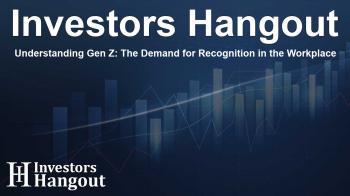Understanding Gen Z: The Demand for Recognition in the Workplace

Understanding the Need for Recognition Among Gen Z
In today's fast-paced work environment, the expectations and behaviors of different generations can often lead to misunderstandings. A recent survey focusing on Gen Z employees has unveiled interesting insights into how young workers prefer to be recognized and given feedback. The study highlights managers' challenges when it comes to providing praise and critique to Gen Z staff, revealing that a significant number seek continuous recognition, sometimes even when they do not meet performance expectations.
The Demand for Constant Praise
According to the compelling results of this study, a striking 76% of managers perceive that Gen Z workers need more recognition compared to their predecessors. In an era where acknowledgment is often felt as essential, 71% of managers also mentioned that young employees expect praise simply for achieving basic responsibilities. More surprisingly, 58% believe that Gen Z actively seeks recognition even when they do not meet specific goals.
Ways Managers Provide Feedback
Understanding the methods to offer praise is crucial for fostering a supportive workplace. Among various strategies, verbal praise shines as the most favored approach, with 19% of managers providing it daily and 84% at least on a weekly basis. In addition, tools like email (37%), recognition software (27%), shoutouts in meetings (23%), and platforms such as Slack (21%) are frequently utilized for providing this feedback. The trend indicates that nearly two-thirds of managers feel a responsibility to complement each critique with positive remarks.
Navigating Emotional Reactions
While feedback is a necessary part of professional development, the emotional reactions from Gen Z employees can be intense. Alarmingly, 38% of managers report that staff have taken sick days after receiving negative feedback. Furthermore, there's a notable 30% indicating that some employees have cried in reaction to constructive criticism.
Challenges in Delivering Feedback
Moreover, instances have arisen where 27% of managers noted that Gen Z employees chose to resign following unfavorable feedback. On another front, 23% have experienced conversations with HR regarding these emotional responses, and one in ten has even had to communicate with a parent of a Gen Z employee after providing criticism. Julia Toothacre, the Chief Career Strategist, emphasizes the significance of integrating both recognition and constructive feedback effectively.
The Importance of Training for Managers
Toothacre notes that avoiding giving feedback can be detrimental, as it prevents growth and erodes trust in leadership. Managers who evade these difficult conversations deny employees the chance to develop and, in the long run, impact team performance negatively. Effective training and support systems for managers can lead to better handling of challenging discussions.
Understanding Gen Z in the Workplace
This insight into Generation Z is incredibly crucial for employers aiming to create a healthy work environment. By understanding the unique needs of this generation, businesses can foster a culture of recognition that not only boosts morale but also enhances overall productivity. Employers who implement feedback strategies tailored to Gen Z’s preferences can cultivate a more engaged and motivated workforce.
Moving Forward in Recognizing Young Talent
Ultimately, grasping the dynamics of generational expectations within the workplace can significantly influence managerial relationships and retention rates. Recognizing the importance of praise and encouragement for Gen Z can help bridge the generational gap and create a more cohesive and motivated workplace environment.
Frequently Asked Questions
Why does Gen Z need more recognition compared to previous generations?
Gen Z has grown in an environment rich in technology and social media, leading to heightened expectations for constant feedback and acknowledgment in their professional lives.
What are some common methods of providing feedback to Gen Z employees?
Managers often use verbal praise, emails, recognition software, team shoutouts, and communication tools like Slack to offer feedback effectively.
How does Gen Z typically respond to negative feedback?
The responses can often be emotional; some may take sick days, express distress openly, or in extreme cases, resign from their positions.
What strategies can managers employ to effectively support Gen Z?
Employing the sandwich method of feedback—mixing constructive criticism between two positive comments—helps create an environment of trust and openness.
Why is manager training essential when dealing with Gen Z?
Training helps managers develop skills to communicate effectively and empathetically with Gen Z, ensuring that feedback fosters growth and does not create fear or anxiety.
About The Author
Contact Owen Jenkins privately here. Or send an email with ATTN: Owen Jenkins as the subject to contact@investorshangout.com.
About Investors Hangout
Investors Hangout is a leading online stock forum for financial discussion and learning, offering a wide range of free tools and resources. It draws in traders of all levels, who exchange market knowledge, investigate trading tactics, and keep an eye on industry developments in real time. Featuring financial articles, stock message boards, quotes, charts, company profiles, and live news updates. Through cooperative learning and a wealth of informational resources, it helps users from novices creating their first portfolios to experts honing their techniques. Join Investors Hangout today: https://investorshangout.com/
The content of this article is based on factual, publicly available information and does not represent legal, financial, or investment advice. Investors Hangout does not offer financial advice, and the author is not a licensed financial advisor. Consult a qualified advisor before making any financial or investment decisions based on this article. This article should not be considered advice to purchase, sell, or hold any securities or other investments. If any of the material provided here is inaccurate, please contact us for corrections.

